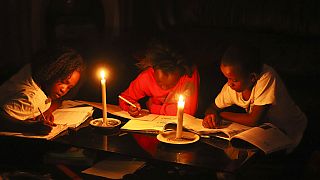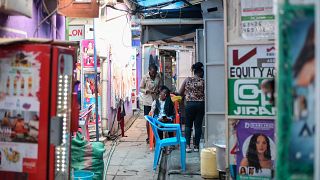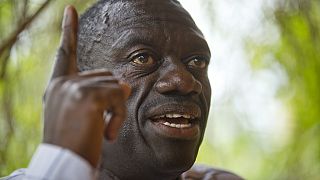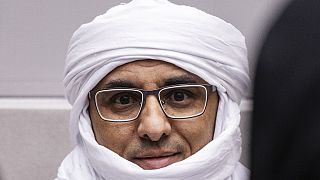Kenya
Synthetic hair comes in a variety of colours and is cheaper than extensions and wigs made with human hair. Many women use them as a single-use product. But what happens with the hair once the user is done with it? In Kenya, a group of women recycles it.
At this hair salon in Kisumu, Kenya, local woman have their hair braided and styled using synthetic hair.
The synthetic wigs, weaves and extensions are made of non-decomposable plastic, and careless disposal can be harmful to the environment.
At Alisam Products Development and Design's workshop in Kisumu, a group of women is dedicated to turning this waste into functional items.
Led by Sarah Adero, they collect discarded synthetic and natural hair waste from salons and turn them into carpets and doormats in an effort to combat environmental pollution.
The women first sort and knit the collected hair into threads before weaving them into the products.
Every woman in the team can make up to 10 carpets per week.
Small carpets can fetch around $3 (USD) and it's up to $16 (USD) for large ones.
"Hair pieces are beautiful when they are plaited but when you remove them from your hair it looks so ugly. Now we decided to recycle it and use it to stop polluting the environment. We use it to make door mats and earn a living out of it," says Adero.
According to Newton Owino, an environmental scientist and founder of Alisam Products Development and Design, the project was inspired by a need to create job opportunities through the reuse of materials.
"Every week people remove their hair and where do they dump them? Just on the surface. There is no specific area, there is no designated place to dump this, So it all litters everywhere and the end result is that they all get back into the lake. Therefore I would call upon the UN environment, the government of Kenya especially the environmental department, also to look at this human waste as a serious matter just like any other waste that they are focusing on," he says.
A consumption world
The project empowers local women to weave their way into a sustainable livelihood, while reducing plastic waste in the community.
Customers, like Vivian Awuor, gives her doormat made from waste hair the thumbs up.
"It is very unique, it is affordable. It helps to conserve the environment, like it makes the environment clean and during this weather it really helps. It can dry faster even in the rainy season, it takes a lot of dust, I really like it," she says.
Amos Wemanya, a Senior Advisor on Renewable Energy and Just Transitions at Power Shift Africa, praises any initiatives focused on circular practices aimed at preserving and restoring the health of Lake Victoria.
"We are living in a consumption world where everyone is consuming a lot more than what is needed. We are having a lot of impact on ecosystems with this over consumption. So I think it is time that the whole society, including here in Kenya, embrace circularity," he says.
Lake Victoria, which is Africa’s largest freshwater lake, is in danger from pollutants ranging from domestic to industrial waste.
According to UN Water, parts of the lake are now considered dead zones unable to sustain life due to oxygen deficiency in the water.
The threats facing the lake are a deep concern for the communities who depend on it for their livelihoods.













01:36
Kizza Besigye faces Military Court as Uganda-Kenya jurisdiction row deepens
02:34
Initiative in Nairobi's Mukuru slums uses fly lavae to tackle food waste
01:48
Kung Fu gains popularity among young people in Kenya
01:38
Drones beat logistical challenges to delivery of medical supplies in Kenya
01:43
Democrats in Kenya fear what the next four years will hold, after Trump's U.S. election win
01:02
Kenya, China hold bilateral talks in Nairobi, as Kenya requests China's support to join BRICS